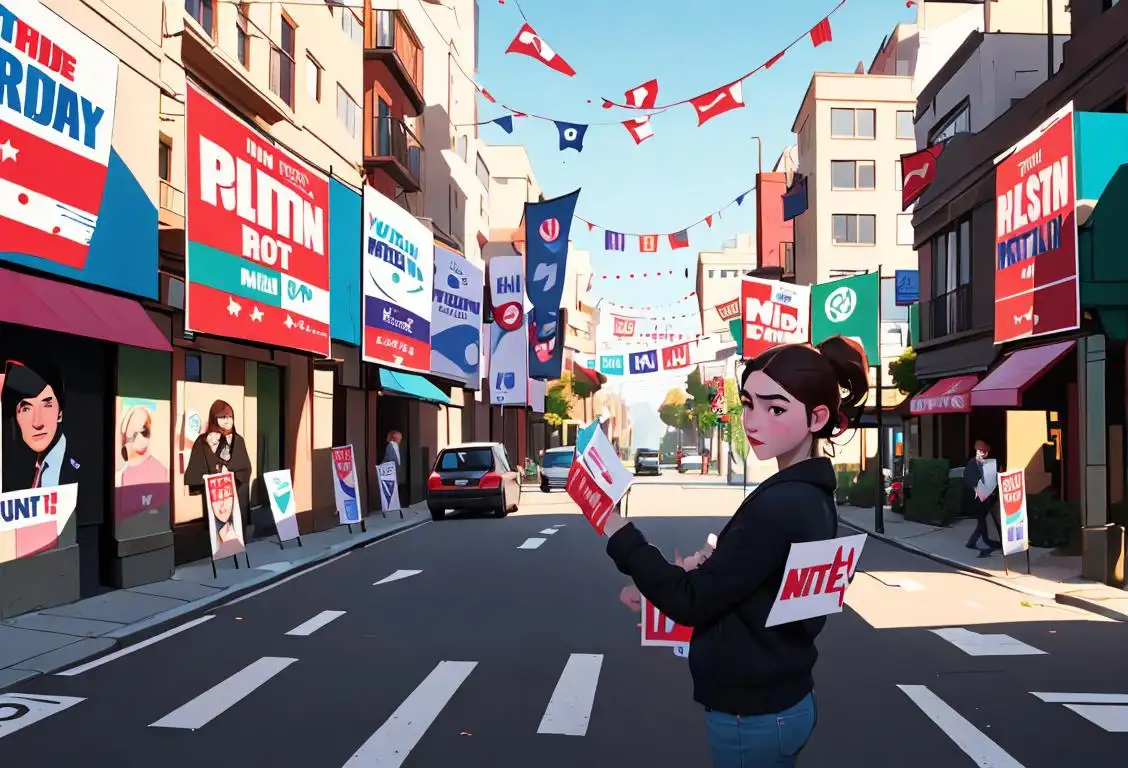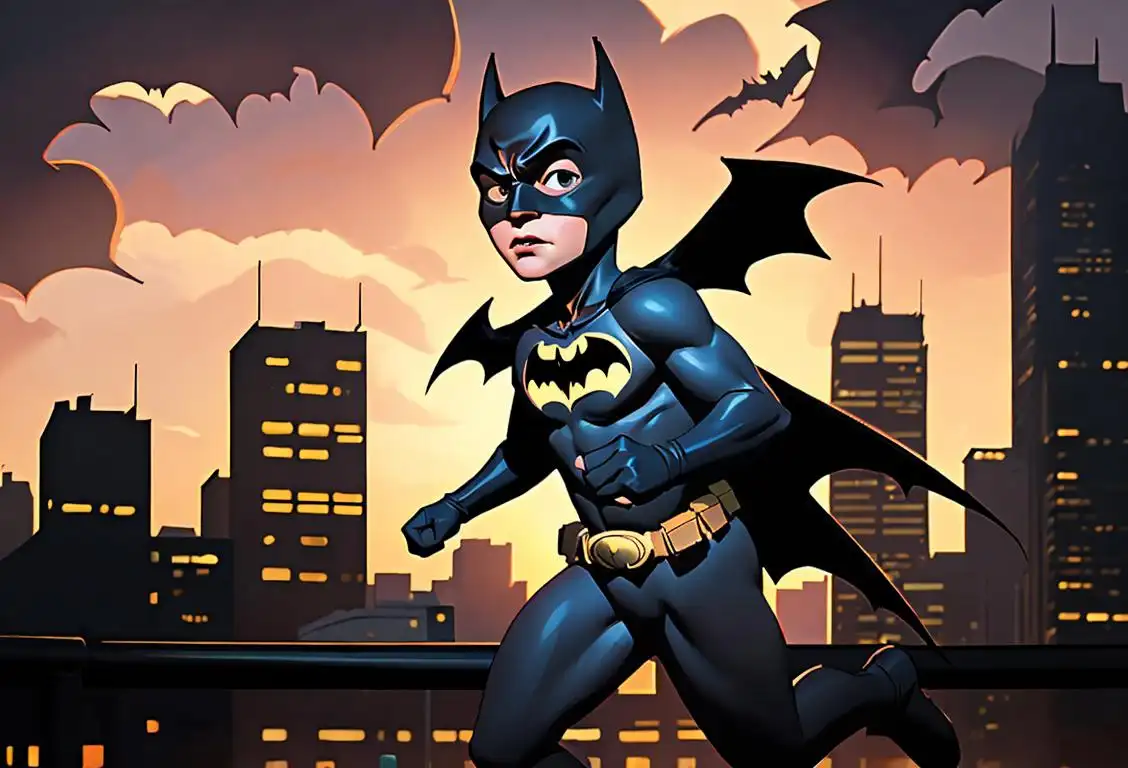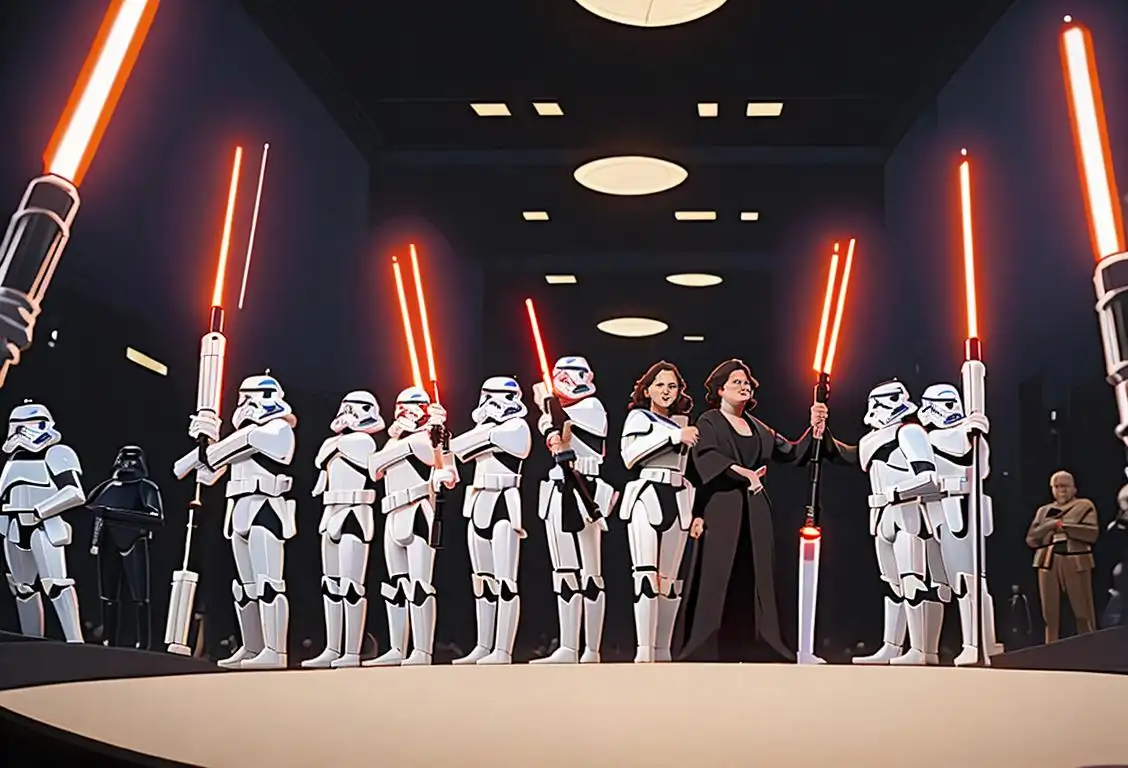National Bandwagon Day

Hey there, bandwagon enthusiasts! Are you ready to hop on the National Bandwagon Day train and join the craze? Well, buckle up because we've got an informative and entertaining ride ahead of us!
When is Bandwagon Day?
It's national bandwagon day on the 7th February.
The Origin of National Bandwagon Day
Every epic trend has to start somewhere, and National Bandwagon Day is no exception. Now, you might be wondering, 'What's the story behind this wacky celebration?' Well, let me enlighten you.
Back in the ancient times of the internet, a fateful day in February 2016 marked the birth of National Bandwagon Day. This day was affectionately named after the beloved online phenomenon of 'jumping on the bandwagon.' You know, when everyone starts obsessing over the same thing, and you don't want to feel left out, so you hop on board too? Yep, that's the spirit we're celebrating here!
Since then, National Bandwagon Day has become a joyful annual festivity where people embrace their inner trendsetter, eagerly joining the latest fads and fashions.
How to Celebrate National Bandwagon Day
Now that you know the history, it's time to get in on the fun! Here are a few fantastic ways to celebrate National Bandwagon Day:
- Join a popular social media trend and show off your moves, your pet, or your cooking skills. Make sure to use those trendy hashtags! #BandwagonDay #AllTheCoolKidsAreDoingIt
- Embrace a new fashion trend that catches your eye. Whether it's quirky hats, funky socks, or neon-colored shoelaces, rock it with confidence!
- Binge-watch the hottest TV series or join the most talked-about book club. You'll have plenty to discuss with your fellow bandwagoners!
- Try out the latest food craze. Avocado toast, unicorn everything, cronuts (yes, that's a croissant-doughnut hybrid), you name it! Just make sure it's delicious.
- Embark on a new hobby that has captivated the masses. Whether it's knitting, watercolor painting, or extreme ironing (yes, that's a thing), go for it!
Fun Fact about National Bandwagon Day
Did you know that National Bandwagon Day holds the record for the most online mentions on February 7th, 2016? Talk about going viral! It seems like the entire internet collectively agreed that bandwagoning was the way to go on that day.
History behind the term 'Bandwagon'
1848
The Circus Wagon
The term 'bandwagon' originated from the entertainment industry of the 19th century. In 1848, the circus wagon, also known as the 'band wagon,' was introduced. It was a large, ornately decorated wagon that showcased the band or musicians in a carnival procession. The vibrant and lively nature of the bandwagon attracted a lot of attention and spectators, becoming a symbol of popularity and success.
1848
Political Wagon
The term 'bandwagon' originated in the political sphere. In 1848, during the United States presidential campaign, a politician named Dan Rice used a circus wagon called the 'bandwagon' to promote his campaign. The wagon was adorned with music and entertainment, attracting a large crowd wherever it went. This innovative tactic quickly gained popularity and became a symbol of joining a popular or winning cause.
1848
Political Origins
The term 'bandwagon' originated in the world of politics in the year 1848. It derives from the practice of campaigners using a bandwagon, a large wagon designed to carry a band during a parade, to attract attention and gain supporters. Politicians would ride on the bandwagon to show their popularity and encourage others to join their cause. This concept of 'jumping on the bandwagon' became synonymous with supporting a winning or popular movement.
1848
The Political Context
During the US presidential election of 1848, the term 'bandwagon' made its first appearance. In this year, Dan Rice, a famous circus clown, used a bandwagon decorated with a brass band to attract attention and gain support for his preferred candidate, Zachary Taylor. People were swayed by the excitement and enthusiasm surrounding the bandwagon, often hopping on board to show their support.
1848
The Emergence of Circus Bandwagons
In 1848, the term 'bandwagon' first emerged as a descriptor for the colorful and ornately decorated wagons used to transport musicians in circuses. These wagons became a defining feature of parades, as they would often lead the procession, attracting attention with their vibrant appearance and lively music. The term 'bandwagon' was derived from the idea that people would want to join in on the excitement and jump onto the wagon to be a part of the fun.
1892
Political Usage of 'Jumping on the Bandwagon'
By 1892, the term 'jumping on the bandwagon' had transitioned from its circus roots to the political realm. During the U.S. Presidential campaign that year, supporters of the candidate Benjamin Harrison used the term to encourage others to join their cause. The idea was that if a person saw others joining a movement or supporting a particular candidate, they would feel compelled to do the same in order to be on the winning side. 'Jumping on the bandwagon' became a synonym for following popular trends or joining a cause without thoughtful consideration.
1884
Political Use
The term 'bandwagon' began to gain political connotations in 1884 during the U.S. Presidential campaign. During the campaign, a political cartoon by A. B. Frost titled 'Third Term Panic' depicted the Democratic Party candidate, Grover Cleveland, riding a bandwagon. This represented politicians joining the popular movement to gain support and success. Since then, 'jumping on the bandwagon' became associated with the idea of following a popular trend or opinion for personal gain.
1890
Jumping on the Bandwagon
The term 'jumping on the bandwagon' came into common usage in the late 19th century. It referred to the act of opportunistically joining a movement or cause that was already gaining significant popularity. The image of people literally jumping onto a bandwagon vividly portrayed this idea of following the crowd without much thought or commitment.
1896
The Musical Bandwagon
By 1896, the term 'bandwagon' expanded its meaning beyond politics. It became associated with the world of entertainment, specifically music. People started using 'bandwagon' to describe the accompanying band that would play music and entertain the audience during circus parades and other public events. The bandwagon became a symbol of excitement, celebration, and a sense of being part of a larger movement.
1892
The Expansion to Sports
The term 'bandwagon' expanded beyond politics in 1892 when it started being used in the context of sports. The popularity of baseball as America's favorite pastime led to fans jumping on the 'bandwagon' of successful teams. As a team gained more victories and garnered attention, more fans started supporting them, often claiming to have been loyal supporters all along.
1910
Literal Bandwagon
In 1910, the term 'bandwagon' took on a more literal meaning. With the rise of advertising and publicity stunts, traveling musical acts used actual bandwagons to advertise their performances. These wagons would drive through streets, playing music and attracting a crowd. People were enticed to 'jump on the bandwagon' and join the excitement of the upcoming show, which further solidified the term's association with following a popular trend or event.
1910
Bandwagon in the Written Word
The term 'bandwagon' found its way into written literature in 1910 when a book titled 'My Lady Peggy Goes to Town' by Helen D. Ward was published. The book included the line, 'They jumped on the bandwagon mostly, I guess.' This usage cemented the term's popularity and firmly associated it with the idea of blindly following trends or popular movements.
1904
The Bandwagon Effect
The term 'bandwagon' began to be associated with a psychological phenomenon known as the 'bandwagon effect' in 1904. It refers to the tendency of individuals to align their beliefs and actions with those of a popular or successful group. This effect mirrors the idea of people figuratively 'jumping on the bandwagon' to be part of something that is widely accepted or admired.
1914
Bandwagon Effect in Psychology
In 1914, the concept of the bandwagon effect was formally introduced in the field of psychology. Famed sociologist Robert K. Merton used the term to describe how individuals tend to adopt beliefs or behaviors simply because many others do, rather than making independent and rational decisions. This psychological phenomenon became recognized as a powerful force in shaping public opinion and behavior, particularly in the areas of politics, fashion, and consumerism.
1919
Going Mainstream
In 1919, the term 'bandwagon' gained further popularity and recognition when it was used in an editorial published in the American magazine, Vanity Fair. The article referenced the phrase 'jumping on the bandwagon' as a metaphorical representation of people joining a popular trend or following the crowd. This editorial marked a significant shift in the usage of 'bandwagon' from its original political and musical contexts to become a general term for joining a popular movement or latching onto a trend.
1950
Sports Metaphor
The 1950s witnessed the term 'bandwagon' being widely adopted in the realm of sports. It became a metaphorical expression for people supporting a successful sports team or player who was on the path to victory. 'Jumping on the bandwagon' referred to fans showing support for a winning team rather than being loyal from the beginning. The sports world further popularized the term, solidifying its place in everyday language.
1920s
Social Acceptance
During the 1920s, the term 'bandwagon' became widely accepted and integrated into everyday language. It started to be used beyond politics and literature, finding its way into conversations about fashion, entertainment, and various cultural phenomena. 'Jumping on the bandwagon' became a common idiom, signifying the act of conforming to the popular opinion or trend.
1976
Bandwagoning in International Relations
In the realm of international relations, the term 'bandwagoning' gained prominence in 1976. Coined by political scientist Stephen M. Walt, bandwagoning refers to a state aligning with a more powerful state or joining a dominant alliance for security or perceived benefits. This concept reflects the historical idea of people jumping on the bandwagon to ensure their safety or enhance their position by joining the winning side. Bandwagoning continues to be a significant strategy in global politics and alliances.
1944
Sports Analogy
The sports world adopted the term 'bandwagon' in 1944. Sportswriter John Lardner popularized its use to describe fans who support a particular team only when they are winning. This analogy referred to spectators literally jumping on and off a bandwagon based on a team's success. Over time, the term expanded beyond sports and became widely used to describe people who align themselves with a cause or opinion solely because it is popular at the moment.
1976
Popularized in Modern Culture
In 1976, the term 'bandwagon' gained further popularity with the release of an influential book by Irving Janis titled 'Victims of Groupthink: A Psychological Study of Foreign-Policy Decisions and Fiascoes.' The book explored the concept of groupthink, where individuals conform to group decisions to avoid conflict or dissent. Janis used the term 'bandwagon effect' extensively, popularizing it in modern culture.
Present
Modern Usage
Today, the term 'bandwagon' is commonly used to refer to the act of following a popular trend without much thought or independent judgment. It represents the human tendency to conform and seek social validation. Whether in politics, entertainment, or social media, the concept of 'jumping on the bandwagon' continues to resonate as a reminder of our collective desire to be part of something widely accepted or celebrated.
Modern Times
Wider Usage of 'Jumping on the Bandwagon'
Throughout the years, 'jumping on the bandwagon' has become a widely used phrase in everyday language, outside of political and psychological contexts. It is often used to refer to people following trends or adopting popular opinions without critical thinking. The concept of bandwagoning has expanded beyond its original definition to encompass the idea of conformity and the pressure to conform to societal norms.
1940s
Sports and Bandwagon Fans
In the 1940s, the sports world adopted the term 'bandwagon' to describe fans who only supported a team when it was winning or successful. These fans were seen as fair-weather followers, jumping on the bandwagon of successful teams and abandoning them during rough times. This usage further solidified the negative connotation associated with 'bandwagon,' highlighting the notion of opportunistic allegiance.
2000s
Modern Usage
In the 2000s, the term 'bandwagon' became deeply ingrained within popular culture and internet discourse. It found its place in conversations related to celebrity culture, politics, fashion, and social media trends. 'Jumping on the bandwagon' came to symbolize the act of following trends without genuine interest or conviction. It has become a way to describe the phenomena of people embracing popular ideas or products simply because they are popular rather than for their intrinsic value.
Present
Bandwagon Culture
Today, 'bandwagon' is a widely recognized term used in various contexts. It is often used to criticize or question the authenticity of individuals who align themselves with popular trends without deeper understanding or personal commitment. Whether in politics, sports, or popular culture, jumping on the bandwagon remains a topic of discussion and debate, reflecting the influence of the term on modern society.
Did you know?
Did you know that National Bandwagon Day holds the record for the most online mentions on February 7th, 2016? Talk about going viral! It seems like the entire internet collectively agreed that bandwagoning was the way to go on that day.Tagged
fun pop culture trendFirst identified
7th February 2016Most mentioned on
7th February 2016Total mentions
17Other days
Bandwagon Day
Poll Two Weeks Before Election Day
Talk Like A Pirate Day
Jennifer Aniston Meme Day
Batman Day
Avril Lavigne Appreciation Day
Rubber Ducky Day
Star Wars Day
Mean Girls Day
Level Taehyung Day








